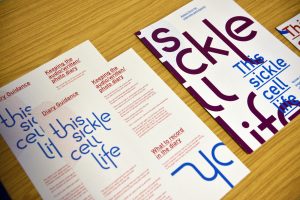
Last week, we headed to Glasgow for the BSA Medical Sociology Annual Conference to share a sneak preview of our findings from This Sickle Cell Life: voices and experiences of young people with sickle cell.
Sickle cell disease is a genetic blood disorder disproportionately found in minority ethnic communities in Britain. It is a chronic debilitating condition that both causes cumulative damage to multiple organ systems, and causes acute pain.
This Sickle Cell Life is part of the work of DEPTH research group at LSHTM. The project explores how people move from using child to adult healthcare services and asks young people about their experiences of living with sickle cell. Transitioning to adulthood is obviously not just something that affects clinical experiences and so we also explore education and relationships, and ask young people what is important to them.
At the BSA MedSoc conference we talked about how healthcare transitions shape the identity of young people, and how these transitions help ‘make’ particular kinds of patients.
Why focus on identity? Health transitions need new health knowledge and new behaviours to develop, but they also need development of self-perceptions and understandings of how a person should behave as an adult (rather than a child) patient. In this way, identities play an important role in shaping health practices and beliefs. Understanding identity development during transitions can help explain why some young people transition smoothly or less smoothly into healthy adulthood.
In our presentation, we talked about how ideas and discourses about self-management and healthy lifestyle within healthcare today act as a way to discipline young people “at a distance”, to quote Miller & Rose (1990) and influence their behaviour. These healthcare self-management discourses intersect with demands from schools that are often not compatible. For instance, schools demand that young people excel and become entrepreneurial, competent individuals, but excelling at school is far more difficult for young people who have to spend time in hospital, or who have to rest regularly to avoid having a pain crisis. These intersecting demands can translate into conflicting “self-disciplining” identities.
For young people with sickle cell, we found that transitions to adulthood involve relentless self-disciplining and self-surveillance to try to be as healthy as possible, while also aspiring to work hard so that they can develop and meet educational and career goals.
You can check back on our updates from the BSA conference on the Sickle Cell LifeTwitter account, here.

